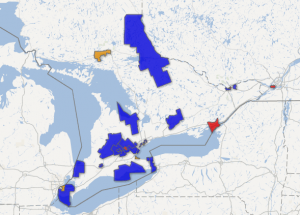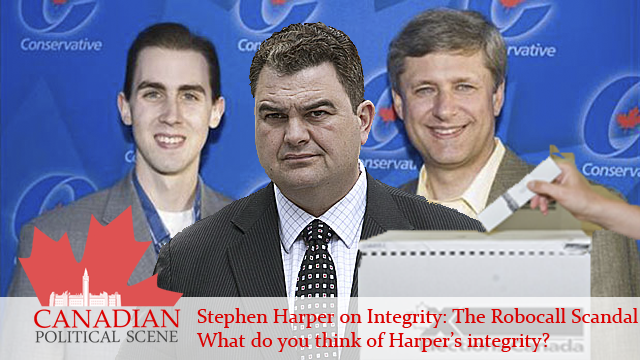The number of close ridings affected by the Robocall scandal keeps climbing and with evidence of links to RackNine and RMG, along with 31,000 phone calls reporting irregularities from voters, there is plenty of evidence to prove something was wrong. However, is it enough to prove to a judge that an election result should be overturned? This list will likely grow over time. If the answer to the question is yes, the Liberals could recoup 4 ridings as a result of Robocall.
In these 4 ridings, the margin of victory was under 1000 – as it was many ridings – but these 4 have a strong historical context that could play an essential part in determining how valid the Conservative wins actually were and help predict their ultimate fate.
Nipissing-Timiskaming
By a mere 18 votes, Jay Aspin beat Liberal Anthony Rota, who had won the riding by about 5000 votes in the last 2 elections. Voters in the riding received calls claiming that polling stations changed and received late night calls from people posing as Liberals. This riding will likely go back to the Liberals.
Mississauga East – Cooksville
Wladyslaw Lizon beat Liberal Peter Fonseca in a riding that had been Liberal since 1988 by only 676 votes. This riding got the robocalls and impersonators as well, but in this riding, some of the impersonators asked for donations. This riding will almost certainly go back to the Liberals.
Winnipeg South Center
Joyce Bateman beat Liberal Anita Neville by only 722 votes. Neville won the riding in 2000 preceding Liberal cabinet minister Lloyd Axworthy. This riding only reports the pesky robocalls and would more than certainly return to the Liberals based on its history.
Willowdale
Chungsen Leung beat Liberal Martha Hall Findlay by only 932 votes where voters got robocalls and impersonators claiming to have changed polling stations and calling at all hours. A complaint has been filed according to the Globe and Mail. The riding had been Liberal since 1988 and will return Liberal if the results are voided.
More ridings are being attested and added to the list of places to investigate. How legitimate were the election results and did the Liberals really lose as badly as they did? The first seats to change will be former Liberal seats – especially in vote-rich Ontario where the party took the biggest beating, especially in southern ridings.
Categories: Accountability, Conservative, Election, Liberal, Robocall Scandal, Scandal
On Monday, the longest campaign in modern history will come to a close and if current polls are any indication, Canada may be seeing a change in government after 9 years of Conservative rule under the leadership of Stephen Harper. Accountability was his calling card in 2006 and today, accountability may very well be one of the defining reasons for his departure.
On Monday, the longest campaign in modern history will come to a close and if current polls are any indication, Canada may be seeing a change in government after 9 years of Conservative rule under the leadership of Stephen Harper. Accountability was his calling card in 2006 and today, accountability may very well be one of the defining reasons for his departure.
In its length, in its cost and in its debate schedule, this election is unusual. The first and possibly only real debate of the campaign ended and here are the highlights of what happened.
In its length, in its cost and in its debate schedule, this election is unusual. The first and possibly only real debate of the campaign ended and here are the highlights of what happened.
Prime Minister Stephen Harper left Rideau Hall this morning with Governor General David Johnston’s approval to drop the writ and Canadians are now officially headed to the polls on October 19. For the first time since fixed election date legislation was brought in by the Conservative government, a fixed election date has been followed.
Prime Minister Stephen Harper left Rideau Hall this morning with Governor General David Johnston’s approval to drop the writ and Canadians are now officially headed to the polls on October 19. For the first time since fixed election date legislation was brought in by the Conservative government, a fixed election date has been followed.
Share this
article with your friends!
What do you think? Leave a comment!






